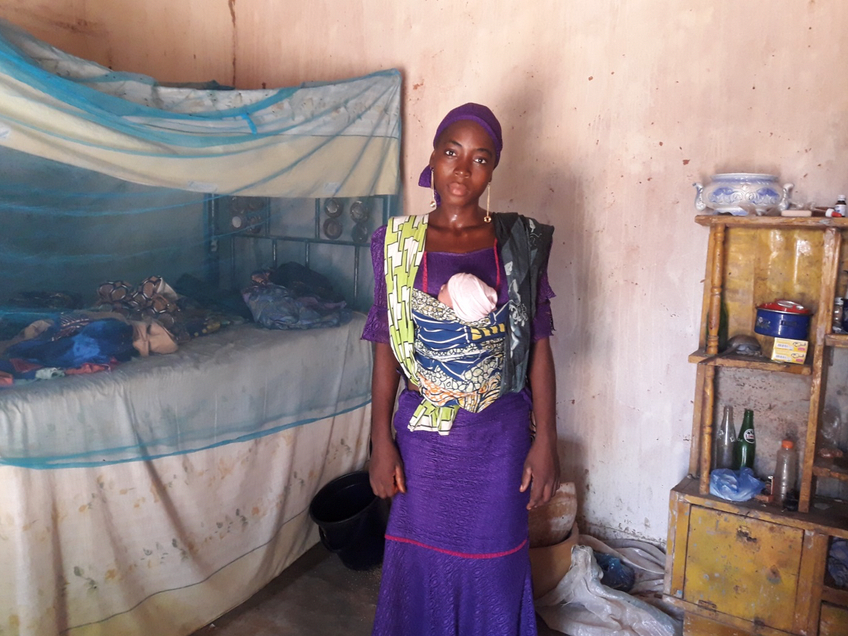Each year, CHAI has the privilege of working with many incredible women who are transforming healthcare in their countries, as doctors, nurses, administrators, midwives, advocates, and more. To celebrate International Women’s Day 2019, we are sharing the stories of three women who have previously been featured on our blog. We are impressed by what they have accomplished, and think you will be too.
Hinde Bello: Simple life-saving birth interventions in Nigeria
Hinde Bello is a traditional birth attendant at the community health center in the village of Gafia, in Katsina, Nigeria. Last year, she assisted in the birth of an infant who was born 28 weeks premature. The baby did not cry, and when Hinde saw that he was not breathing, she used a suction bulb to clear his nose and mouth. Hinde then showed the new mother how to swaddle the now-breathing, crying newborn on her chest to keep him warm until she arranged for transport to a hospital. Today, thanks to Hinde’s quick actions, both mother and child are healthy.
An estimated 31 percent of all newborn deaths in Nigeria are directly related to complications from preterm birth. In 2015 and 2016, CHAI supported the states of Kano, Kaduna, and Katsina to implement an integrated maternal and newborn health program, which included providing health workers with the skills and tools to treat premature births. Skilled birth attendants at primary health centers, and traditional birth attendants like Hinde, were trained to implement immediate life-saving interventions when complications during labor and delivery arise, as well as to refer cases to hospital when needed.
Workinesh*: Raising awareness about the importance of cancer screening in Ethiopia
Workinesh used to think of cancer as a death sentence. She felt a lump in her breast but was afraid to go to a doctor in case she was given a diagnosis she couldn’t do anything about. Then, last October, she learned that the Ethiopian Ministry of Health and CHAI were hosting free breast and cervical cancer screenings at a hospital near her home in Addis Ababa. Health workers explained that screening can help treat or prevent these cancers and despite her fears, Workinesh got screened.
She was diagnosed with breast cancer and has since completed four cycles of chemotherapy. Despite dealing with the difficult side effects of treatment, Workinesh is happy that her tumor has shrunk and thankful for the free screening and quality treatment she received. Based on this experience, she has become an advocate in her community, educating other women about the importance of quality cancer care.
*Name changed to protect patient identity.

Neera Soni, CHAI’s project coordinator, on her way to the Anganwadi Centre to train frontline workers.
Neera Soni:
Neera Soni is one of 137 CHAI-trained project coordinators in Madhya Pradesh, India. She and her peers train community health workers called ASHAs, who function as liaisons between the villages they serve and the public health system. Neera spends most of her days crisscrossing the countryside on her motorbike, checking in on the ASHAs, testing their knowledge and providing further instruction as needed. As a woman working alone and traveling long distances across rural areas, Neera is unusual. But she says she is proud of her efforts. Especially when lives are saved, as in the case of Jamuna and her son. During Jamuna’s first trimester, the local ASHA recognized signs of anemia, which can be deadly for women and is associated with low birth weight and premature birth. Jamuna was tested and the results were positive – she was severely anemic and needed to travel to a larger community health center for treatment. However, her family wanted try homemade remedies. The ASHA called Neera and together they were able to convince the family of the risks Jamuna faced without proper care.
Anemia, combined with childhood malnutrition, which affects over 42 percent of children across Madhya Pradesh, form a deadly inter-generational cycle: a malnourished child is more likely to become anemic as a teenager and then as a pregnant woman, who is more likely to deliver an underweight infant who grows into a malnourished child.






